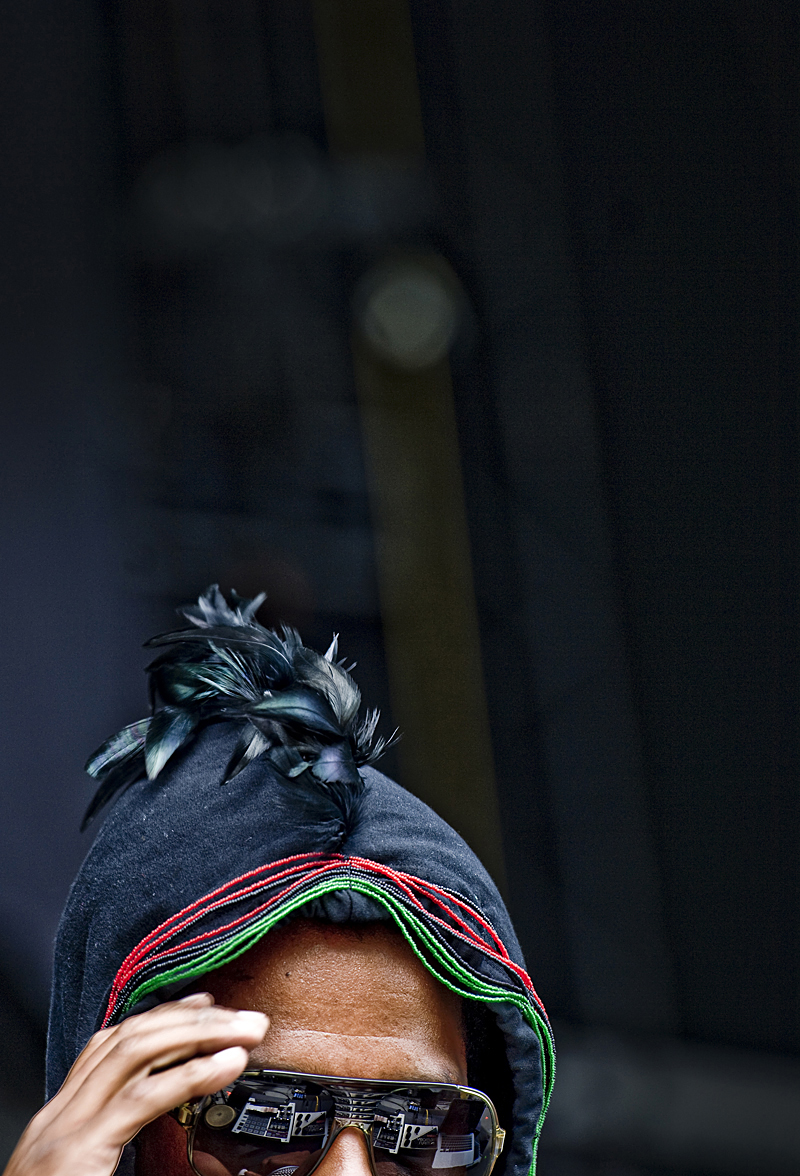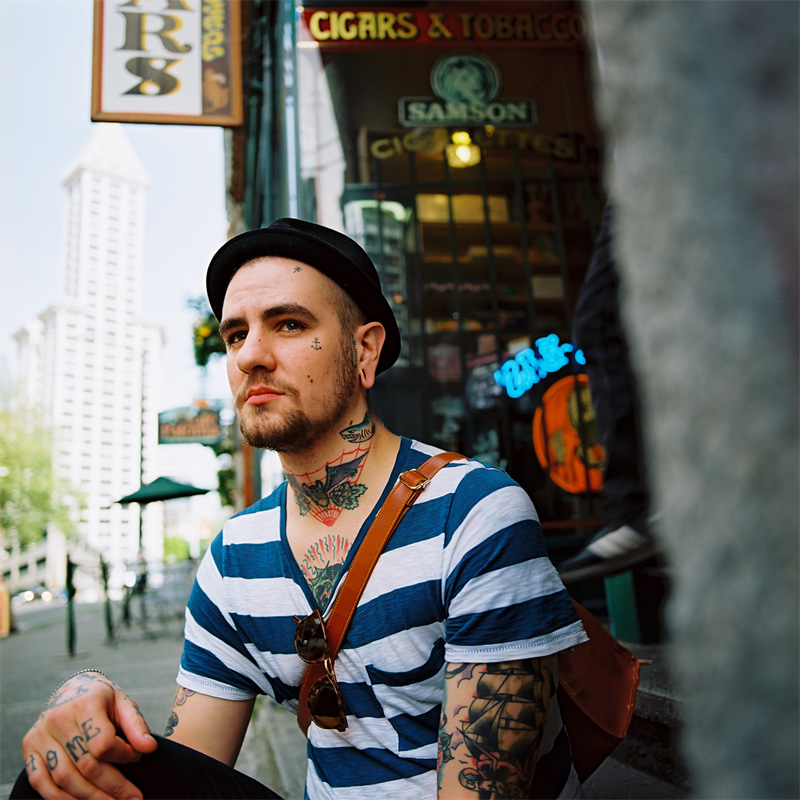On the mostsun-drenched Friday afternoon in an otherwise soggy Seattle spring, hundreds of curious music lovers are crammed inside Ballard’s Sunset Tavern. Dozens more wait patiently outside, hoping someone will leave so they might get in.
Inside, among the din of clanking glasses and idle chatter, a sundress-clad woman in her early 20s nudges her friend and says “I think that’s him,” motioning to a man standing near the tavern’s tiny stage.
Like everyone else inside the bar, the woman is waiting to see Shabazz Palaces and its enigmatic frontman, Ishmael Butler. But the man she just pointed out is not Butler. In fact she, like most of her fellow concertgoers, probably wouldn’t know Butler if he were standing two feet in front of her.
That’s fine with Butler, because he’d rather you not know him.
As chief architect of the city’s most hysterically lauded hip-hop project, Butler has made it his business to stay in the shadows, aggressively avoiding the press and eschewing the now-commonplace idea that artists need to be shameless hucksters of their own brand in order to succeed.
He’s been called a genius, the future of hip-hop, and the greatest rapper alive, and despite his nearly two decades in the music business, much of that praise has come in just the past two years, on the strength of two anonymously released Shabazz Palaces EPs, a handful of performances, and even fewer interviews.
Now, with the June 28 release of his first proper Shabazz album, Black Up, on Sub Pop, Butler is teetering on the precipice of what could be the Grammy winner’s full-blown return to the spotlight. In honor of the occasion, he is ever-so-slightly parting the curtains and giving us a fleeting peek at his life.
If you’re one of the chosen people allowed an audience with him, you quickly run into the first problem with meeting Butler: What do you call him? He is Ishmael, a 42-year-old father, Central District inhabitant, and former Garfield High School basketball star. He is Butterfly, one-third of Digable Planets, the Grammy-winning rulers of early-’90s backpack rap. He is Cherrywine, maker of avant-garde funk-rap.
His current nom de guerre is Palaceer Lazaro, a man often shrouded in mystery. It is as Palaceer that Butler has charged back into cultural relevance by crafting some of the most otherworldly, jarring, head-bobbing new music to echo out of the Emerald City in years.
Inside a Capitol Hill coffee shop on a typically damp spring afternoon, Butler slumps into an uncomfortable wooden chair, looking slightly bewildered and about 15 years younger than he actually is. Despite being downright geriatric in the disposable-hero world of hip-hop, the dusting of grey in Butler’s goatee is the only thing keeping him from getting carded these days.
Onstage he’s all swagger, bobbing and weaving to the beat like a prizefighter. But in person, Butler is soft-spoken and deliberate. He makes little eye contact and has an easy smile that he’s quick to unleash when talking about things he enjoys, such as traveling, the feel of performing, and his musical love for labelmates Helio Sequence and Fleet Foxes.
When addressing topics that don’t interest him, which can be rounded up to include the past, the future, and most things associated with his creative process, the smile disappears and Butler stares out the window, longing to be anywhere but here. He contemplates the distasteful questions for what seems like an eternity, searching for just the right way to tell you that he won’t tell you anything.
And it’s not only questions about his art that Butler takes a pass on. Even simple questions, like who’s in Shabazz Palaces, will get you little more than a blank look. (The most noticeable and constant Shabazz Palaces collaborator is multi-instrumentalist and fellow Central District resident Tendai Maraire, who declined to take part in this story.)
Despite taking deliberate steps to keep his name and likeness as far away from Shabazz Palaces as possible, Butler insists he’s not trying to be cagey or mysterious. As far as he’s concerned, he’s simply striving to make the best music he can, and everything else is the product of a bored and lazy media.
“Everybody needs content nowadays,” Butler says of the much-played-up mystery angle. “A lot of it is manufactured, and I knew that. There was a lot of misinterpretation, but that kind of thing runs rampant nowadays. It’s not about mystery.”
Butler’s quick to disown his role in creating the enigmatic persona that has earned him so much mileage in the music press, but in truth he’s directly responsible for shaping it. In early interviews with both local and national media, Butler asked writers not to mention his legal name or reference his former band, and some obliged him.
And in what has to be his most bizarre tic, Butler has made it his mission to keep his photograph off anything related to Shabazz Palaces, including his own websites, album covers, and flyers advertising his show. Not only did he refuse Seattle Weekly‘s request for a photo shoot, until last week he was one of the few acts in Sub Pop’s vast stable without a promotional picture on the website.
Butler’s shtick would drive most record executives to the bottle, but so far it hasn’t fazed Sub Pop co-founder Jonathan Poneman, who signed Shabazz Palaces last year. Poneman says Butler has free rein to market himself any way he sees fit. “We trust him as an artist. And part of his artistry is how he chooses to represent himself.”
Butler won’t cop to any subterfuge when it comes to his shape-shifting ways and his need to create new musical identities, and when he does address the subject, it’s in his own opaque way. “It’s like putting clothes on. If you put on a certain outfit, someone that knows you really well might not even recognize you, but underneath it all it’s still you,” he says. “All the new stuff, all that stuff from back then, is in there too. It’s dressed up differently, but it’s essentially the same.”
Whether he’s the purest artist in the world or just a musician with a knack for marketing is anyone’s guess, but that doesn’t mean people can’t have an opinion about why Butler is the way he is.
Craig Irving is an MC who performs under the moniker Cee Knowledge, but he’s best known as Doodlebug from Digable Planets. Irving has been Butler’s friend and collaborator for 20 years, and their shared history has given him a unique vantage point on Butler’s recent success.
According to Irving, part of the reason Butler became so gun-shy toward the press was that the music he made after Digable Planets broke up, such as the criminally overlooked album Bright Black, recorded as Cherrywine, was all too frequently compared to his work as Butterfly. “People weren’t looking for something new. They wanted Digable Planets, and they still looked at him as Butterfly,” Irving says. “They couldn’t grasp the idea of him not being Butterfly. It’s like Henry Winkler. No matter what he does, he’ll always be the Fonzie.”
Even though he has his own take, Irving says sometimes it’s best to just sit back and let Butler do what he does.
“I’ve known him a long time, and he’s still enigmatic to me. He is what he is,” Irving says. “He’s always been ahead of his time, musically, as a lyricist and a producer. By the time people really catch on to Shabazz Palaces, he’ll probably just disappear.”







